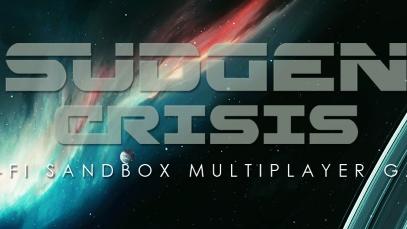isaac asimov
Latest

Apple's latest 'Foundation' trailer features an enormous space elevator
The blockbuster sci-fi series premieres on September 24th.

Apple TV+ adaptation of 'Foundation' will star Jared Harris and Lee Pace
Apple isn't cutting corners with its TV+ version of Isaac Asimov's Foundation. The tech giant has cast its first two stars for the show, choosing Chernobyl's Jared Harris (above) to play math genius Hari Seldon and Halt and Catch Fire's Lee Pace as the Emperor of the Galaxy, Brother Day. The show already had some pedigree behind it through showrunner David Goyer, who wrote Terminator: Dark Fate and is working on Netflix's The Sandman.

Seldon Crisis rebrands as Sudden Crisis
Seldon Crisis -- the name, at least -- is no more. The science-fiction sandbox has rebranded itself as Sudden Crisis following an IP dispute that left its Kickstarter campaign neutered. "We want to let everyone know that the project and game now has a new name: Sudden Crisis," the studio posted to Facebook. "Everything stays the same, this is the last change needed to separate us from one world and open a new one, one wholly created by us and you. You will shortly see the change take effect across our sites." Sudden Crisis is currently in the middle of an Indiegogo campaign to raise funds for the project.

Seldon Crisis removes Asimov references following IP dispute
The sci-fi sandbox Seldon Crisis initially tried to draw attention to itself through copious amounts of name-dropping with revered author Isaac Asimov, although it turns out that this marketing plan may have backfired. Its Kickstarter campaign has been canceled, with page saying the game is "the subject of an intellectual property dispute." The team attempted to clarify the situation with a post earlier this week: "We were/are speaking with the Asimov estate regarding a partnership, but until those talks are concluded we were asked to not mention certain elements of his novels. This is completely understandable (copyright law demands holders actively protect their copyright or they can lose it). We have taken the necessary measures to fully comply with what has been stated." In the meantime, Seldon Crisis' fundraising efforts have moved over to Indiegogo, where the team is attempting to rake in £250,000 over the next month.

Isaac Asimov-inspired Seldon Crisis debuts
Fans of both Isaac Asimov's Foundation series and sandbox science-fiction MMOs will find something to appreciate in the newly announced Seldon Crisis. This "completely player-driven MMO" is loosely inspired by Asimov's writing and will be starting a Kickstarter campaign next month to fund its development. Developer Chaos Interactive is eschewing linear progression for Seldon Crisis, leaving it to players to run the economy and galactic politics. There will be "thousands" of systems to explore, a wide variety of missions for player captains, and work for various factions. Lead Game Designer Mirko Campochiari said that it will be a game for the players: "We are taking MMO gaming back to its roots with an uncompromising game that truly rewards player ability and a return to old-school game mechanics, such as a full loot system, to create a challenging and more involved gameplay environment." We've got your first look at Seldon Crisis, with concept art, screenshots, and a model video below. [Source: Crisis Interactive press release]

Robots learning our pain threshold by punching humans and seeing if they cry
The first rule of robotics is you do not talk about robotics that a robot should not injure a human being or, through inaction, allow a human being to come to harm. But how does a robot know when its acts or omissions are causing nearby fleshies discomfort? The obvious way is to scan for the same signals of distress that we humans do -- facial, physical, and aural -- but another, more fun, way is to just hit people over and over again and ask them how much each blow hurt. That's what professor Borut Povse over in Slovenia is doing, in a research project he describes as "impact emulation," where six test subjects are punched by a robotic arm until they can't take it anymore. It's funny, yes, but it's also novel and a somewhat ingenious way to collect data and produce more intelligent machines. Of course, whether we actually want more intelligent machines is another matter altogether. [Thanks, Anthony]

The Daily Grind: Is there a place for diplomacy in an MMO?
'Violence is the first refuge of the incompetent', wrote Isaac Asimov, and to a certain extent, that's true. But in an industry that caters to these primal impulses -- and thriving off of them, as well -- is there room for the non-violent path? Certainly, the violent response is more fun than talking it out, at least in an urge overkill kind of way, but surely that's just a matter of implementation.If we truly want to simulate any sort of real-life experience in our games, the full range of social interactions ought to have a place, including politics. And it's one thing to try to reason with an AI, but if you can create a lasting peace with another human player, you have something to be proud of. But is it necessary, or would diplomacy in a combat-oriented game merely detract from the experience?

Sci-fi MMO, you're my only hope...
The Ancient Gaming Noob wrote a fascinating article about why sci-fi MMOs haven't flourished. It's certainly not a new topic, but the Noob backs his argument up with credible facts and a strict analytical comparison (as opposed to the boisterous blatherings of the typical forum troll) that prove his point.In Is there hope for a science fiction MMORGP?, the Noob posits that fantasy MMORPGs came about (and became more popular) due to a series of environmental factors that were present for the fantasy genre, but not for sci-fi. He compares four major factors: literature, table top RPGs, computer RPGs, and MUDs (aka Multi-User Dungeons). The body of historical fantasy literature provides the major ground work for the other three categories. While "The Lord of the Rings" might pop into your head first, Tolkien's great novels were not the beginning of the fantasy genre. As illustrated by the Noob, much older works such as Sir Walter Scott's "Ivanhoe," and Sir Thomas Malory's "Le Morte d'Arthur" existed. But the trump card? The 11th century Beowulf is the oldest surviving epic poem written in the English language. It's a fantasy story. The entire fantasy genre has been ingrained into our collective human psyche for centuries.And what does science fiction have? Uh, not much. At least not compared to those legendary scripts. Granted there are some "old" science fiction tales, but the genre as we know it today didn't exist until the early part of the 20th century. I don't mean to knock the likes of Isaac Asimov, Robert A. Heinlein, Arthur C. Clarke, or Kevin J. Anderson, but in a historical context the space traveling genre is the new kid on the block. And as the Noob so eloquently points out, some of Asimov's own underlying scientific theories haven't held up so well over the years.Take a gander at Noob's article then come back here and let us know what you think. Are you a fantasy fanatic? Or do you yearn for a great sci-fi game that will even the decidedly lopsided MMO table back in the favor of ray guns and aliens?

Japanese prof thinks robots need emotional sensibilities
Aside from providing the world with great gadgets, entertainment devices and robots -- the Japanese have now answered the question that every robot enthusiast since Isaac Asimov has been trying to answer: how do we improve robot-humanoid interaction? Professor Shuji Hashimoto, director of the humanoid robotics centre at Waseda University in Tokyo, has a theory: robots need a solid dose of those Japanese manners (don't we all?) encompassed in the Japanese word kansei, which includes feelings, mood, intuitiveness and sensibility. Hashimoto spoke to a conference on "socially intelligent robots" at the University of Hertfordshire in Hatfield, UK last week, saying that "Robots are going to need similar emotional capabilities if they are to cooperate smoothly and flexibly with humans in our residential environments." How would that translate from the theoretical academic ivory tower to the living room lab of a domesticated robot? According to NewScientist, who covered Hashimoto's UK talk, "if a robot's owner is sweating and has a racing pulse, say, the robot will sense this and decide that now might not be the time to offer them the TV guide or tonight's dinner menu." Still, we're sure that Hashimoto wasn't talking smack about our new favorite polite robot, the EMIEW -- otherwise we might have to sic a legion of BEAR robots on him.[Thanks, Matt]


